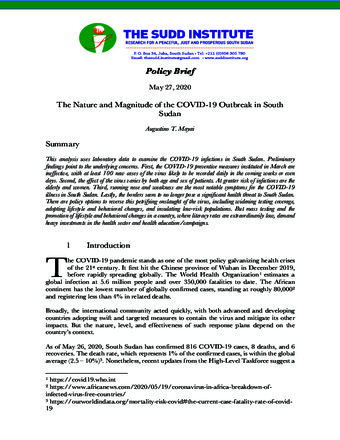The Nature and Magnitude of the COVID-19 Outbreak in South Sudan
Publication Summary
This analysis uses laboratory data to examine the COVID-19 infections in South Sudan. Preliminary findings point to the underlying concerns. First, the COVID-19 preventive measures instituted in March are ineffective, with at least 100 new cases of the virus likely to be recorded daily in the coming weeks or even days. Second, the effect of the virus varies by both age and sex of patients. At greater risk of infections are the elderly and women. Third, running nose and weakness are the most notable symptoms for the COVID-19 illness in South Sudan. Lastly, the borders seem to no longer pose a significant health threat to South Sudan. There are policy options to reverse this petrifying onslaught of the virus, including widening testing coverage, adopting lifestyle and behavioral changes, and insulating low-risk populations. But mass testing and the promotion of lifestyle and behavioral changes in a country, where literacy rates are extraordinarily low, demand heavy investments in the health sector and health education/campaigns.
Augustino Ting Mayai's Biography
Augustino Ting Mayai is the former Managing Director of the Sudd Institute. He is a founding Research Director of the same institution, serving in this capacity for a decade. He holds a Ph.D. in Sociology, with concentrations on demography and development from the University of Wisconsin-Madison. He currently studies how state effectiveness affects child health outcomes in South Sudan and Ethiopia. Dr. Mayai has written extensively on South Sudan’s current affairs. August is the current Chair (Statistician General) of the National Bureau of Statistics, Government of South Sudan.

